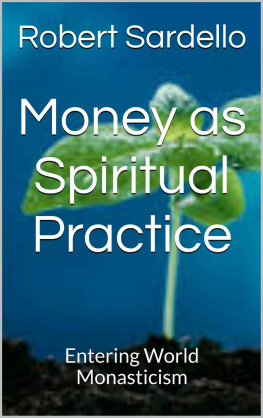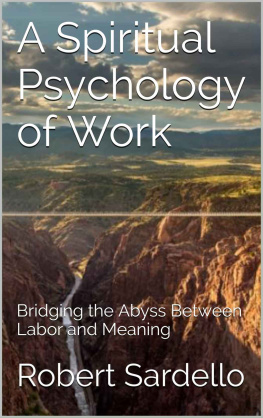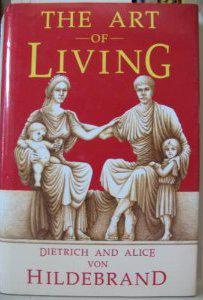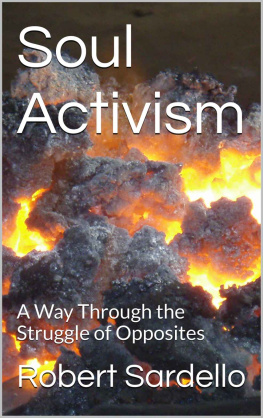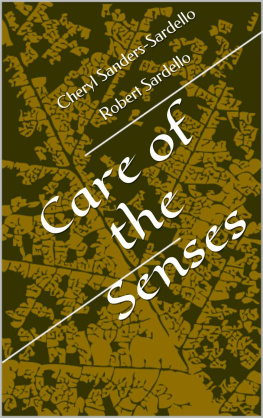Robert Sardello - The Power of Soul: Living the Twelve Virtues
Here you can read online Robert Sardello - The Power of Soul: Living the Twelve Virtues full text of the book (entire story) in english for free. Download pdf and epub, get meaning, cover and reviews about this ebook. year: 2012, publisher: CreateSpace Independent Publishing Platform, genre: Religion. Description of the work, (preface) as well as reviews are available. Best literature library LitArk.com created for fans of good reading and offers a wide selection of genres:
Romance novel
Science fiction
Adventure
Detective
Science
History
Home and family
Prose
Art
Politics
Computer
Non-fiction
Religion
Business
Children
Humor
Choose a favorite category and find really read worthwhile books. Enjoy immersion in the world of imagination, feel the emotions of the characters or learn something new for yourself, make an fascinating discovery.
- Book:The Power of Soul: Living the Twelve Virtues
- Author:
- Publisher:CreateSpace Independent Publishing Platform
- Genre:
- Year:2012
- Rating:3 / 5
- Favourites:Add to favourites
- Your mark:
- 60
- 1
- 2
- 3
- 4
- 5
The Power of Soul: Living the Twelve Virtues: summary, description and annotation
We offer to read an annotation, description, summary or preface (depends on what the author of the book "The Power of Soul: Living the Twelve Virtues" wrote himself). If you haven't found the necessary information about the book — write in the comments, we will try to find it.
The Power of Soul: Living the Twelve Virtues — read online for free the complete book (whole text) full work
Below is the text of the book, divided by pages. System saving the place of the last page read, allows you to conveniently read the book "The Power of Soul: Living the Twelve Virtues" online for free, without having to search again every time where you left off. Put a bookmark, and you can go to the page where you finished reading at any time.
Font size:
Interval:
Bookmark:


Copyright 2002, 2012 by Robert Sardello
All rights reserved.
No part of this book may be used or reproduced in any manner whatsoever without the written permission of the author.
Published by Goldenstone Press, www.goldenstonepress.com
ISBN: 978-0-9832261-4-7
eBook ISBN: 978-1-62346-236-9
Cover: Medieval sculpture by Giovanni di Balduccio, from the Portinari Chapel at the Basilica of SantEustorgio, Milan, Italy.
Title page: The First Stage of the Great Work, better-known as the Alchemists Laboratory. Credited to architectural painter Hans Vredeman de Vries (1527-1604)
Cover and book design by Richard Wehrman, www.merlinwood.net
G OLDENSTONE P RESS
Goldenstone Press seeks to make original spiritual thought available as a force of individual, cultural and world revitalization. The press is an integral dimension of the work of the School of Spiritual Psychology. The mission of the School includes restoring the book as a way of inner transformation and awakening to spirit. We recognize that secondary thought and the reduction of books to sources of information and entertainment as the dominant meaning of reading places in jeopardy the unique character of writing as a vessel of the human spirit. We feel that the continuing emphasis of such a narrowing of what books are intended to be needs to be balanced by writing, editing and publishing that emphasizes the act of reading as entering into a magical, even miraculous spiritual realm that stimulates the imagination and makes possible discerning reality from illusion in the world. The editorial board of Goldenstone Press is committed to fostering authors with the capacity of creative spiritual imagination who write in forms that bring readers into deep engagement with an inner transformative process rather than being spectators to someones speculations. A complete catalogue of all our books may be found at www.goldenstonepress.com . The web page for the School of Spiritual Psychology is www.spiritualschool.org
10 9 8 7 6 5 4 3 2 1
Acknowledgments
With great appreciation to Richard Wehrman who took on the task of redesigning this new edition. The result is a truly beautiful book!
I also acknowledge the John E. Fetzer Institute for providing a grant to make the writing of this book possible. In particular, I am grateful to Carol Hegedus and Rob Lehman.
I am also grateful for the many people that pushed to have this book re-published, particularly the reading groups in Greensboro, NC., Albuquerque, NM, and Los Angeles, CA.
Contents
T he word virtue is highly charged. It is a word with a great history, maybe as old as humankind. It exists in Eastern as well as Western cultures. We do not hear much of this word today, partly because we are interested more in the shadowy side of life than in the doing of the good. I think our culture is ready for a turnaround. The new door to concern for virtue was shown to us on September 11, 2001, in New York City, Washington, D.C., and the skies over Pennsylvania, where all of the virtues described in this book were displayed, initiating us into a new era of doing the good (see the ). Given this situation of our culture, telling you how I use the word virtue might be helpful as a beginning.
I do not approach virtue from a religious perspective. This book is not about being a virtuous person, if you hear that word as referring to being pious. This book is about locating the essence of our soul, and coming to have an inner sense of how soul wants to function in the world to bring about the good. We are now accustomed to hearing about soul in its sufferings, its need for beauty, its love of story, myth, creativity, and more recently, the soul of the world. Soul also wants to act. And when we enter deeply into soul life, we become receptive to what comes to us from the spiritual worlds.
The virtues are the glimmerings within the soul of the spiritual urgings to bring our life into harmony with the rhythms of the cosmos. Virtue concerns closing the gap between the earthly world and the spiritual worlds. There are not two worlds unless we go away from acting in accordance with the Great World and create an artificial separation where there is none. Such a separation produces cultural egotism of the crudest and cruelest kind. We can certainly forget that we are citizens of the cosmos, that Earth and her beings are part of the functioning of the whole. This writing seeks to remind us that we not only belong to the whole but also bear responsibilities to act in accordance with the grandeur and beauty of the universe.
These days, spiritual development, popularly understood, often means learning to concentrate on the chakras, do various forms of meditation, search for ones higher self, engage in shamanic work, image work, dream work, and a myriad of other possible practices. Very little attention is given to inner moral development, in spite of the fact that absolutely every spiritual tradition places priority on the importance of character and very little on the kinds of experiences many present-day spiritual practices seek. It is certainly the case that working to develop and deepen in the virtues has as one of its effects the gradual opening to kinds of experiences not available to ordinary consciousness. It is not at all the case, however, that working to develop psychic or even spiritual capacities alone results in becoming a person who seeks and does the good.
Spiritual development can and often is sought for questionable reasons. Having out-of-body experiences, journeying to other worlds, becoming clairvoyant, developing healing capacities, finding a connection to the higher selfall such matters are considered to be of little importance to spiritual development in the great religious and spiritual traditions. In fact, developing such capacities is seen in these traditions to present great challenges. We must learn to look beyond them and never become enamored. In other words, we must actually learn to overlook the capacities that develop in order to continue deepening in soul. This caution toward seeking spiritual experiences indicates that spiritual work, as understood for thousands of years, is never done for the sake of ourselves alone, but always for the whole of the world. The virtue of virtues is that through them our spiritual efforts are always kept in touch with the earthly world and the soul and spiritual needs of others.
The context in which every person can develop in the qualities of the virtues is our daily life, in the midst of our connections, trials, difficulties, and joys with others. Another way of seeing the virtues would be that they are the soul medium of our spiritual relationships with others. The virtues constitute the way of sacred service in the world, for they are the means through which we serve the soul and spirit of other human beings. Only when we serve in this manner can a whole community flourish. However, serving the soul and spirit of others has to be distinguished from serving another person or serving the outer needs of another. Further, such serving must be freely chosen and not based upon power or authority or position.
In daily life we are often in situations in which a kind of serving of others is demanded. These demands occur in family life, in work, in intimate partnerships, in social situations. We typically respond to overt or covert demands out of love for the other person, duty, obligation, or fear. None of these ways of responding, in themselves, can be considered a practice of virtue. These situations, however, can be the place of labor, the laboratory for the practice of the virtues.
Next pageFont size:
Interval:
Bookmark:
Similar books «The Power of Soul: Living the Twelve Virtues»
Look at similar books to The Power of Soul: Living the Twelve Virtues. We have selected literature similar in name and meaning in the hope of providing readers with more options to find new, interesting, not yet read works.
Discussion, reviews of the book The Power of Soul: Living the Twelve Virtues and just readers' own opinions. Leave your comments, write what you think about the work, its meaning or the main characters. Specify what exactly you liked and what you didn't like, and why you think so.




